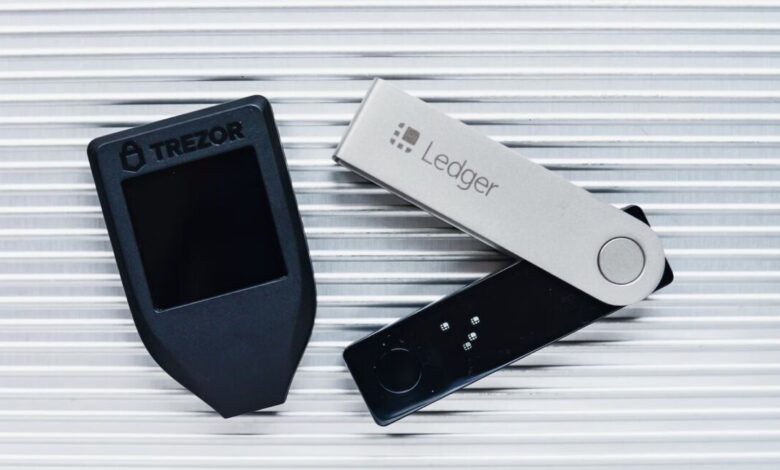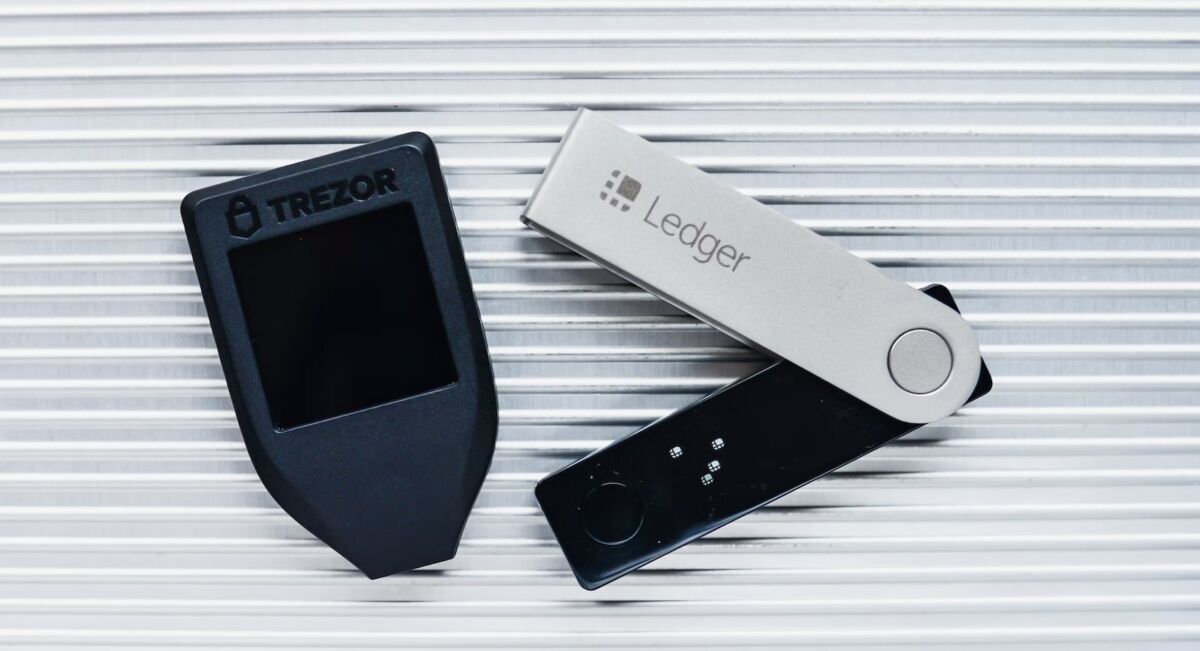
A crypto wallet is a type of software that enables individuals to securely store, manage, and transfer digital currencies. It operates similarly to a conventional wallet, except it does not store physical cash or cards. Instead, it “stores” digital currencies like Bitcoin (BTC), Ethereum (ETH), and other cryptocurrencies.
Users are provided with a distinct address by crypto wallets, which they can utilize to send and receive cryptocurrencies.
Crypto wallets are used to store the private keys needed to access and manage digital assets. These wallets can be categorized as either custodial or non-custodial, depending on how they handle the storage and management of a user’s private keys. A custodial wallet involves a third party, usually an exchange, holding the user’s cryptocurrency on the “owner’s” behalf. — warning; the third party actually owns the crypto, not you.
On the other hand, a non-custodial wallet allows individuals to store their crypto offline or in a personal wallet, giving them complete control over their assets — it is not under anybody elses custody; you have full ownership and responsibility.
Different Kinds of Crypto Wallets
There are two main types of crypto wallets based on who has control over the private keys: custodial and non-custodial wallets.
Crypto wallets that are custodial in nature are managed by a trusted third party, such as a wallet provider or an exchange. These custodians are responsible for holding and safeguarding the private keys of the wallets on behalf of the users. Users place their trust in these custodians to ensure the security of their wallets. Custodial wallets can be either hot or cold wallets, which are further elaborated below.
By choosing decentralized wallets, you have complete authority over your private keys. However, it is your responsibility to ensure the security and protection of these keys. Furthermore, decentralized wallets can function as either hot or cold wallets, as elaborated further:
There are various options available for storing and managing your cryptocurrency assets, with each type of wallet having its own pros and cons. Below are some of the most popular types of crypto wallets, categorized based on storage and accessibility:
Crypto hardware wallets (aka “cold wallets”) are physical devices designed to securely store private keys for cryptocurrency. They are widely regarded as one of the most secure methods of storing digital assets. These wallets are usually kept offline, minimizing the chances of being hacked.
Two options for hardware wallets include Trezor and Ledger.
Crypto software wallets (aka “hot” wallets) are digital wallets that can be downloaded and installed on your computer or mobile device. They come in different types, including desktop, mobile, and online wallets. These wallets can either be custodial or non-custodial, providing a great level of flexibility and accessibility. However, it’s important to note that software wallets may be at risk of hacking attempts.
Two examples are Exodus and MetaMask.
Paper wallets are a type of offline wallets (cold wallet) that are created and printed on paper. They provide a secure method of storing cryptocurrency assets as they are not connected to the internet. However, it’s important to store them properly to avoid the risk of loss or damage.
Web wallets are virtual wallets that can be accessed through a web browser such as FireFox or Chrome. They are a type of software wallet that provide a convenient way to store and manage cryptocurrencies and NFTs online and thus are vulnerable to hacking attacks e.g MetaMask.
Crypto mobile wallets can be easily installed on a mobile device for convenient use. However, it is crucial to ensure proper security measures are in place to safeguard the wallet from potential hackers.
When it comes to selecting a crypto wallet, your decision will ultimately hinge on your individual preferences and how much risk you are willing to take. It is crucial to conduct thorough research and opt for a wallet that aligns with your specific circumstances and requirements.
Advantages of Using Crypto Wallets
Crypto wallets are widely favored by cryptocurrency users due to the various benefits they offer. Here are a few key advantages of utilizing a crypto wallet:
Using a crypto wallet may seem daunting at first, especially for novices. However, it is actually a relatively simple process that can be broken down into a few easy steps. Here are some guidelines on how to utilize a crypto wallet:
1. Choose a suitable crypto wallet: To get started, select a crypto wallet that aligns with your preferences and
Tips for Ensuring the Security of Your Crypto Wallet
When it comes to safeguarding your crypto wallet, there are a number of precautions that you should take:
Tips for Selecting a Crypto Wallet
For values that are significant to you, always choose a secure hardware wallet.
Selecting the perfect crypto wallet can be a challenging endeavor. With a wide range of options to choose from, it’s crucial to carefully weigh your choices before making a decision. The most vital aspect to prioritize when selecting a crypto wallet is security. Opt for wallets that provide robust security features such as two-factor authentication, multi-signature support, and biometric authentication to enhance the safety of your assets.
When selecting a wallet, it is crucial to take into account the specific type of crypto you intend to store. It is important to note that not all wallets are compatible with every cryptocurrency. Therefore, it is advisable to choose a wallet that supports the specific coins or tokens you possess.
When it comes to cryptocurrency, it is important to consider accessibility and the user interface of your chosen wallet. If you are new to the crypto world, opting for a wallet with a user-friendly interface is highly recommended. Additionally, it is crucial to choose a wallet provider with a good reputation and a long-standing presence in the industry. This will help guarantee the reliability and security of your crypto wallet.
When choosing a wallet for your crypto and NFT transactions, it is essential to consider the fees charged by different wallets. Opt for a wallet that provides reasonable fees to ensure your profits are not significantly affected. Additionally, evaluating the level of customer support offered by the wallet provider is crucial. A reliable customer support system can greatly assist you in resolving any problems or difficulties you may encounter with your wallet.
Important Tips for Safely Managing Crypto Wallets
When it comes to handling your crypto assets, it is vital to avoid making common mistakes that could compromise the security of your crypto wallet. Here are a few key errors you should steer clear of:
Frequently Asked Questions:
What is the process for creating a backup of my cryptocurrency wallet?
In order to secure your cryptocurrency wallet, it is essential to securely store your private key. This private key is a series of words that can be utilized to recover your wallet. There are a couple of options to safeguard your private keys: you can opt for a hardware wallet to store them offline, or you can write down your seed phrase and keep it in a secure location. This ensures the safety of your crypto assets and NFTs.
In the event of unintentionally deleting my crypto wallet, what are the consequences?
The safety of your cryptocurrency wallet is paramount to avoid the permanent loss of your funds. It is essential to protect your private keys and seed phrases along with your money. While customer service might assist in recovering funds from a custodial wallet, this is not always guaranteed.
Are digital currency wallets secure?
Crypto wallets can provide security if you follow the necessary precautions to protect your private keys or seed phrase. Nonetheless, it’s important to be aware of potential risks such as malware, phishing, and hacking attempts. To mitigate these dangers, it is crucial to utilize reputable wallets and consistently safeguard your private keys or seed phrases.
Is it possible to store different types of cryptocurrencies in a single crypto wallet?
There are different types of wallets available, some of which are capable of storing multiple cryptocurrencies, while others are specifically designed to store only one cryptocurrency. Therefore, it is important to ensure that the chosen wallet is compatible with the specific coin you wish to store before using it.
What is the process for sending and receiving cryptocurrency using a digital wallet?
To perform transactions with cryptocurrencies, such as crypto and NFTs, you must provide your wallet address, private key, or seed phrase. To receive crypto, share your wallet address with the sender. When sending crypto, enter the recipient’s wallet address along with the desired amount, and then authorize the transaction using your private key or seed phrase.
